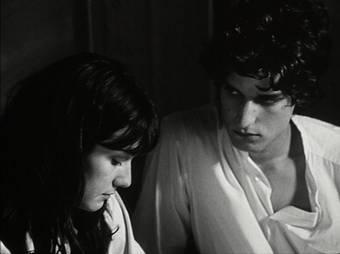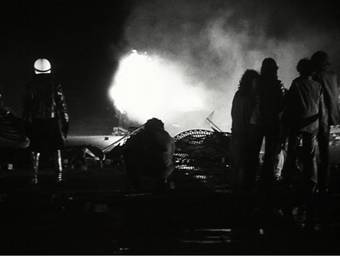|
I've
read some rather passionate responses to Regular
Lovers [Les Amants réguliers] from both sides of the critical divide. It's been hailed
as the best French film of the year by some and panned as the worst
in fifty by others. It has been described alternately as mesmerising
and mind-numbing. This division of opinion
extends to perceptions of the film's intentions. According
to some – the film's British distributor included – the film
was a response to Bernardo Bertolucci's 2003 The
Dreamers, but others dismiss this as bunkum. Mind
you, given the similarity of subject matter, the fact that
both star Louis Garrel, and that Regular Lovers
was directed by Garrel's father Philippe, a man who shot
a great deal of documentary footage during the real Paris
uprising (much of which was subsequently lost), it would
be a bit of a co-incidence if there was not a link.* But
even those who claim there is no direct connection have
managed to forge one of their own, casting the two films
as Celebrity Death Match-style opponents for the
Paris Uprising movie crown. Thus many of those who hated
Bertolucci's film have openly embraced Garrel's, while the
opposing camp wishes that Regular Lovers
was even a fraction as involving as its slightly elder opponent.
That both films were directed by French industry veterans
only serves to fan the flames.
So
which camp do I chose to sit in? Well, both of them, actually,
and at the same time neither. I can appreciate both points
of view, offer supporting evidence for each, but still have
enough ammunition to shoot both off at the knees. Yes, it's
THAT sort of film, and I use the term film deliberately
– I have a feeling Garrel would just hate for his creation
to be called a movie.

Harking
back to the look and feel of the Nouvelle Vague,
especially the works of Jean Eustache, Robert Bresson and, to a
degree, Jean-Luc Godard, the film quickly introduces us to its leading
man, student and aspiring poet François. A short
while later he and his fellow comrades are out on the streets
and taking part in the notorious Night of the Barricades,
and this is where opinions will really start to divide.
Events here shown not in the expected (and perhaps obvious)
manner by placing the characters in the heat of the action,
but though a series of static shots of largely peripheral
inactivity, almost all filmed from a distance and all held
on for far, far longer than would seem necessary. The Pro camp
would argue that this footage has a genuine documentary
feel and captures the essence of what it is like to be on the fringes of the uprising after
the main event, and that it definitely does. The more cynical
will doubtless smile at this low budget get-around that
avoids having to actually stage anything as complex or expensive
as a street riot.
Cinematically,
the pace occasionally varies but never drastically alters
course. The editing speed is upped a tad when François
is chased by the police, but we are still in the position
of dispassionate observer and remain so for the entire first third
of the film. Once François starts hanging out with
his fellow students at a pad owned by wealthy friend Antoine,
where he smokes opium and talks about the revolution and
poetry, he meets and begins a relationship with Lilie
and the two hang out for pretty much the remainder of the running time. This is
briefly interrupted for walks, a trip to get more drugs,
a party (the film's liveliest sequence), and a visit to court
for refusing military service.
The
film's supporters claim there is an earthy authenticity
to all of this that Bertolucci's film completely bypassed,
and they may be right. For much of the time this feels more
like documentary than drama, and the sense of place and
time is sometimes vividly captured, aided immeasurably by William Lubtchansky's
gorgeous high contrast black-and-white photography. There
is occasionally a sense, in the edge-of-riot sequence especially,
that Garrel is attempting to recreate his lost documentary
footage from the period, and increasingly you get the feeling
that he wanted us to see all of it. The developing
relationship between François and Lilie in particular
sometimes feels almost unedited, like a Nouvelle Vague-influenced
Big Brother, where we are invited to sit
and watch every small moment between the two, no matter
how inconsequential it may seem. Once again this feels utterly
authentic. The problem for many, myself included, is
that François and Lilie are as dull a screen couple
as I've encountered all year, and I neither engaged with
them on any real level nor cared much for their fate, and
at nearly three long hours the task of attempting any sort
of empathy is too easy to abandon.

It's
hard to be certain from the film itself where Garrel's sympathies
really lie here. Certainly when François asks questions
like "Can we make a revolution for the working class
despite the working class?" you're not sure whether
this is an expression of his youthful naivety or delusional
self-importance. One thing I was left in no doubt about was
that if there's going to be a revolution then there's no
way it should be left to these guys. But maybe that's be the point. Many of us spent our student years with
angry and lofty political ideals and hopes of changing the
world, but even those of us who stuck by our beliefs have
become depressingly aware of the Herculean nature of the
task, particularly in a world that seems to choose the rampant lust for
money and power over ideals and fair play every time. And
where is that righteous anger now? Certainly when François
says "They don't understand that life is what counts,
not money," he may be stating the obvious, but increasingly it's
a statement worth making.
It's
easy to make the case for Regular Lovers
as art over entertainment and argue that in the spirit
of his lead character, Garrel has created a work that rejects
commercial concerns in favour of a form of cinematic poetry.
The opposing view would doubtless accuse the film
being just like its two main protagonists, who look good
but say very little of consequence, and take a really long time
to do so. For myself, I found the film intermittently fascinating
and evocative, but in the end was neither compelled nor
enlightened, and as a result have no immediate plans to
revisit it.
Shot
in Academy ratio on high contrast black-and-white stock,
there are certain aspects of any transfer that are
to be expected, namely that grain is going to be visible throughout
and shadow detail is going to be virtually non-existent.
These are not print or transfer faults but very much part
of the chosen aesthetic. In all other respects, the transfer
here is largely excellent, with blacks thicker than
an oil slick on a moonless night, a very pleasing quality
to the greys and highlights, and detail as good as you could
hope for. Very occasionally, there appears to be a faint
overlay that looks like a slight transfer or tele-cine glitch,
but it's rare and not exactly intrusive.
The
sound is Dolby 2.0 stereo – none of your modern 5.1 nonsense here.
In truth is is highly appropriate to the the film's shot-in-the-60s
feel, and is clear without being striking. There is a slight
hiss detectable in quieter scenes (of which there are many),
and sound recording sometimes reflect the limitations of
the location acoustics.
Given
the near three-hour length of the feature and the quality
of the transfer, I was surprised there was room on the disc for any
special features, but Artificial Eye has still managed to squeeze
on the Venice Film Festival Press Conference
(27:47). There are a few hesitant moments,
but some interesting revelations nonetheless, not least
that Garrel took advantage of the far bigger budgeted The
Dreamers to buy or borrow the costumes, props and
even extras when they were finished with them. Although holding
court with both of his lead actors, the director does most
of the talking, and poor Clotilde Hesme doesn't get to say
a word. Picture quality here is again first rate.
There
are also Filmographies for Philippe
Garrel, Louis Garrel and Clotilde Hesme.
Funnily
enough, I was not that surprised when Garrel, in the press
conference extra on this disc, identified Gus Van Sant's
Last Days
as one of the great films of recent years. There are certainly
similarities in pace and tone to Regular Lovers,
and neither boasts much in the way of narrative, but this
did prompt me to wonder why I was blown away by Van Sant's
film but left largely cold by Garrel's. And it's a question
I can't easily answer, although I remember when first watching
Last Days being struck by the fine line
that Van Sant was walking, how what was strangely mesmerising
must on paper look like deadly viewing. And of course, for
many it was just that, which brings us right back round
to the issue of subjectivity, and try as I might, like any
viewer I can only be subjective about the film I am watching,
and for me Regular Lovers tried to walk
that line and simply fell off it. Others will and do disagree,
but if you have the cash to spare and think this may be
your glass of tea, then you can't go wrong with Artificial
Eye's DVD, which has a fine transfer and one worthwhile
extra feature.
*
Garrel himself claims that the two films being conceived
and made so closely in time to each other was indeed co-incidental,
so who knows.
|